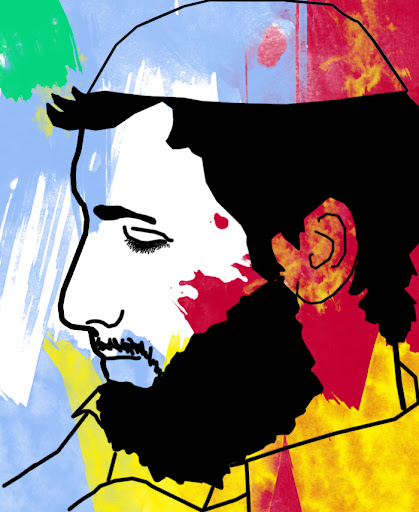While Reb Mottel'nu was heading West and and Reb Shmel'ke was heading North, their paths soon crossed in the border town of Ustilah. As fate would have it, their two wagon drivers, Pavel and Ivan both decided to stop for a rest and a healthy drink in the local tavern.
The two wagon drivers soon become inebriated with vodka, and in little time began to speak about their current assignments.
"I'm taking a Rabbi to the city of the Czar!" Ivan boldly declared.
"Fancy that!" called out Pavel, his words slurred by the heavy kiss of lady spirit. "I too have a Rabbi in my carriage and am heading to Petersburg!"
Ivan's eyes grew wide, and as he downed another cup of vodka, chasing it with hearty Baltic porter and a generous handful of herring.
"You may also have Zhid in your carriage - but mine is by far the holiest Zhid in the Empire!"
The comment took Pavel by surprise, forcing him to spit out the contents of his cup.
"What are you saying that your zhid is better then mine! My Moshke had hundreds of people from out town wish him off on the journey! My rabbi is far greater."
And so the argument escalated, each wagon driver enumerating the praises of 'his' rabbi, and cursing the others.
Finally, in an act of rage Pavel jumped to his feet,
"I'll show you Ivan! I'll show you whose Jew is better!"
Storming out of the tavern, he ran to Ivan's carriage, and throwing open the doors, landed a sound smack on the face of an entirely unprepared R' Mottel'nu.
Shocked by the disrespect shown to his patron, Ivan ran to Pavel's carriage and upon opening the door, gave an equally ill-prepared R' Shmelke a series of heavy blows on the back.
Not letting his new opponent get away with the upper-hand, Pavel took Ivan's rabbi and through him to the ground.
As such the fighting continued for a few more minutes, each wagon driver defending his patron by showing his aggression to that of the other. At last Ivan jumped into his carriage and began to flee the scene of the fight. In hot pursuit, Pavel began to give chase . . . leaving the two bruised Rabbis in the mud of the tavern's front yard.
A goodly king of long ago once had two precious sons. The children, wont to copy the comings and goings of the court, would play rival kings in the small private garden allotted to the family of the monarch.
The garden, sparse as it was in the inner sanctum of the massive fortress, had a few small apple trees and a small hill with a bench in the center. This hill became the subject of the desires of the two would-be kings. Endless battles were waged for the hill.
One day, as the battle continued on for many hours, the two small boys began to forget the game behind their war, and soon took to throwing rocks and bruising each-other in the ultimate battle for the hill. Hearing the shouts of pain and anger, the king ran to the small garden and saw his only sons fighting over the hill.
"Children! Children! Why are you fighting? This is only a little hill in our castle . . . Why are you fighting over it when the entire world belongs to you?!"
וד''ל ואין צריך להאריך בדבר המביא צער
Technorati Tags: Chabad, Rebbe, Judaism, Parables









8 comments:
yep.
The first story seems to say that we have to respect what other people hold holy. Dangerous idea, young man.
-e: I neithe see what you say mashma in the story ( it wasn't my kavana for sure) nor, in any event, find any problem in such a point . . .
The point of the story is that both goyim thought they had something holy. The problem was when they thought that the other guy's holy thing weakened their holy thing's holiness. Hence the need to respect other people's holy things (i.e. their holy books, their ideas about life, the universe, and everything, etc.)
-e: fine - in that case 100% true. I wrote it in mind that m'shlogt zach, uber ver krigt di petsch un ligt in blotte? Nar dem Rebbe'n. In a wider sense you're right though . . . B'tana achas - the nimshol must taka be dome l'moshol . . . You have to be fighting over a rav (fitting of the name)
You have to be fighting over a rav (fitting of the name)
Aha! Typical slippery fundi response.
-e: typical non fundi response! What you say would only make sense if I was taking someone else's words and trying to k'vetch ein my own pshat - but if I wrote it myself - I can very we'll be m'dayuk in the words
I suppose you can interpret your own stories.
Post a Comment